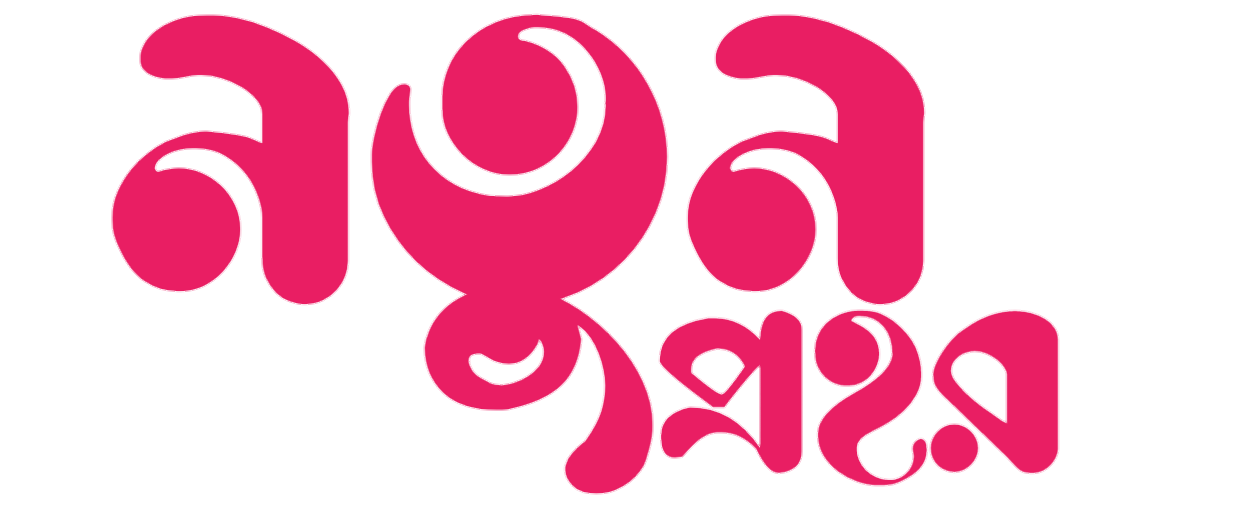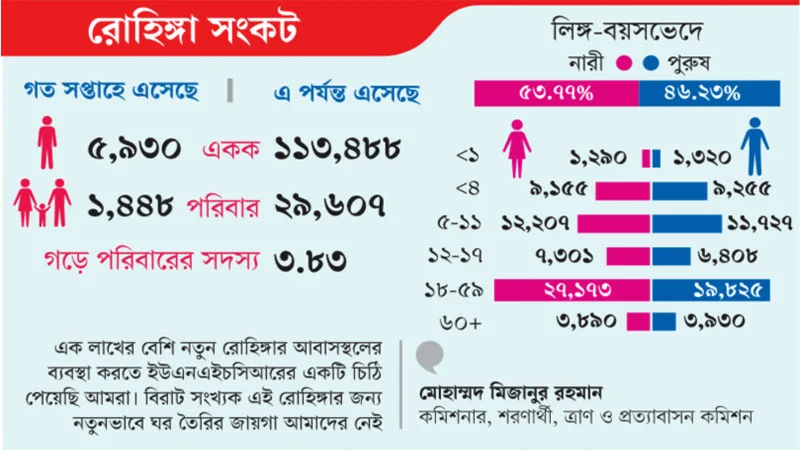As of Saturday, 113,000 new Rohingyas have entered Bangladesh from Myanmar's Rakhine state. Bangladesh and the United Nations High Commission for Refugees (UNHCR) have already taken their fingerprints jointly. With these, the total number of Rohingyas taking refuge in Bangladesh has reached at least 1.313 million. However, the government has not yet allowed the new Rohingyas to be identified through Irish.
The UNHCR has written to Bangladesh to arrange housing for the newly arrived Rohingya. They submitted the letter to the Office of the Refugee, Relief and Repatriation Commissioner (RRRC) last week. A responsible source confirmed this information to Samakal on Sunday night.
Sources said that the Rohingyas who came in the past one and a half years from November 2023 to Saturday have been newly identified. Most of them came after May-June last year. Concerned people said that Rohingyas are entering Bangladesh almost every day this year.
Last week alone, 1,448 families arrived from Rakhine. In addition, another 5,930 people arrived separately. The newly arrived Rohingyas are members of 29,607 families. Despite Bangladesh's vigilance at the border, 53.77 percent of the 113,000 newly arrived Rohingyas are women, the rest are men.
Another source says that most of the newly arrived Rohingya are currently staying with their relatives in 20 camps in Cox's Bazar. Among the newly arrived Rohingya, 8,368 are in Camp No. 27, 7,772 in Camp No. 26, 6,395 in Camp No. 24, 5,955 in Camp No. 9, 5,940 in Camp No. 12, 5,788 in Camp No. 18, 5,746 in Camp No. 4, 5,331 in Camp No. 13, 4,331 in Camp No. 7, 4,165 in Camp No. 7, 4,130 in Camp No. 17, 3,972 in Camp No. 15, 3,340 in Camp No. 8, 3,194 in Camp No. 1-W, 3,110 in Camp No. 2-E, 3,103 in Camp No. 5, 3,38 in Camp No. 10, 2,893 in Camp No. 16, 2,893 in Camp No. 3, 2,831 in Camp No. 19, 2,815 in Camp No. 2, There are 2,771 people in Camp No. 21, 2,457 in Camp No. 2-W, 2,269 in Camp No. 8-W, 1,603 in Camp No. 14, and 1,504 in Camp No. 20. Many people have taken shelter in various educational institutions in the camps. UNHCR has requested that housing be provided for all Rohingya. The government has not yet responded. However, the UN Refugee Agency has been verbally informed that it is difficult to provide housing for millions of new Rohingya in the current reality. It has been asked to inform what other infrastructure the UNHCR has in the camp, including schools. After this, UNHCR says that if it is not possible to build separate houses, it should consider whether two-story houses can be built.
Bangladesh is facing various challenges and risks with more than 1.2 million Rohingyas living in various camps in Teknaf and Ukhiya, Cox's Bazar. Bangladesh is negotiating with the international community for their repatriation to their own country. Now, instead of repatriation, Bangladesh is facing pressure from more Rohingyas entering the country.
When asked, RRRC Commissioner Mohammad Mizanur Rahman told Samakal last night, "We have received a letter from UNHCR to arrange for housing for more than one lakh new Rohingyas. We do not have space to build new houses for this large number of Rohingyas." He said that this effort to build new housing will make Rohingya repatriation difficult. Because it will encourage other Rohingyas in Rakhine to come to Bangladesh.
According to multiple sources, Rohingyas have been entering Bangladesh anew since the conflict between the junta government and the Arakan Army in Rakhine State. Even after the junta government was defeated there, the flow of Rohingyas has not stopped. Now, Rohingyas are coming almost every day in various ways, in addition to the Naf River, through the mountain roads.
The budget crisis for the Rohingya has been looming since the Trump administration took office in the United States. When asked how funds will be provided for new housing for the Rohingya in such a situation, a concerned official said that UNHCR will seek funding from donor agencies if it gets the green light from the government for the construction of houses.
Responsible sources say that among the newly arrived Rohingyas, 3,890 are women over 60 years of age and 3,930 are men. 27,173 are women aged 18-59 and 19,825 are men. 7,301 are women aged 12-17 and 6,408 are men. 12,207 are women aged 5-11 and 11,727 are men. 9,155 are women aged 1-4 and 9,255 are men. In addition, 1,290 are women under one year of age and 1,320 are men.
Security analysts and concerned people say that Bangladesh is already in a multi-faceted crisis with more than 1.2 million Rohingyas. Despite many negotiations, they are not being sent back to Myanmar. Under the Joint Response Plan (JRP), the international community is providing financial assistance to the Rohingyas and local people who have taken refuge in Cox's Bazar. However, the promised allocation is decreasing every year. In such a reality, the new influx of Rohingyas is creating new pressure for Bangladesh.







